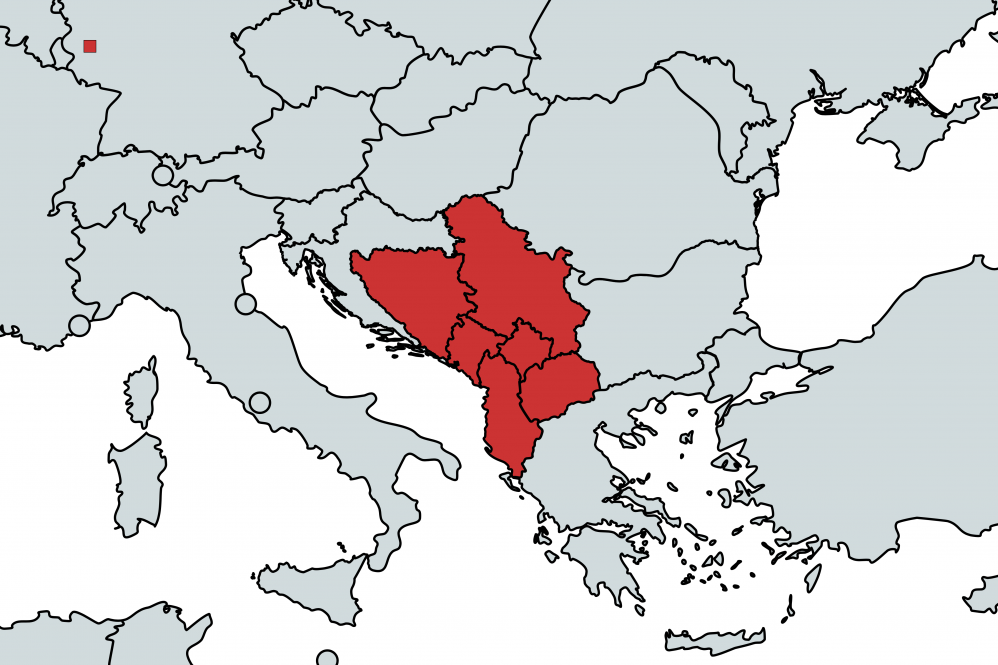In early November 2023, Serbian Foreign Minister Ivica Dacic expressed his determination that Serbia should become “a full member of the International Organization of the Francophonie”. This statement came during a meeting with representatives of the Group of Francophone Ambassadors (GAF), ahead of the bi-annual summit of the Francophonie held in Djerba at the end of the month. This episode illustrates the political expansion of the French language and its institutions, including in countries where the Francophonie does not have a recognized cultural and linguistic influence. The Balkan countries are largely part of this trend. However, we will focus specifically on the non-EU Western Balkans, namely Albania, Bosnia-Herzegovina, Kosovo, Northern Macedonia, Montenegro and Serbia. Although they have distinct cultural characteristics, these states face development, cooperation and integration issues that can be brought together and for which the Francophonie can play a role.
The practice of the French language has declined but differences remain between countries
While the Balkan Francophonie often evokes Romania at first glance, it is worth remembering that the Balkans as a whole have a certain Francophone tradition, and more broadly Francophile. It is nevertheless up to us to qualify this heritage since the francophonie is now more or less prevalent depending on the countries of the region, especially since the borders and the peoples have often moved during the last centuries and even the last decades. The IOF estimates that the French-speaking population in Serbia is currently 4% of the total population (245,000 people), 2% in Northern Macedonia and Montenegro (43,000 and 13,000 people respectively), and 1% in Albania, Bosnia-Herzegovina and Kosovo (30,000, 26,000 and 26,000 people respectively).
France and Serbia have had important cultural ties throughout history. As early as the 19th century, famous French writers, such as Lamartine and Victor Hugo, stayed in Serbia and produced veritable odes to the Serbian people, who were extremely courageous in their struggle for freedom. There followed an artistic honeymoon between the two nations, which saw many painters whose influences intermingled. In the 20th century, the Franco-Serbian alliance during the First World War strengthened the existing ties. Serbian elites quickly learned French and cultural exchanges multiplied. Although the phenomenon is no longer as widespread as it once was, and political relations between the two states have lost some of their luster, French remains a relatively widespread language and is taught as a foreign language to a significant part of the population.
As for Albania, the only country in the Western Balkans that did not emerge from the break-up of Yugoslavia, the French-speaking and francophile tradition is probably even more deeply rooted there than in Serbia. In addition to French support for the Kosovar cause, France had supported the independence of Albania since the First World War, when it occupied the south of the country, at the time disputed between Austria-Hungary and Greece. Since then, the French high school in Korça has educated a number of local elites, so much so that Albanian Prime Minister Edi Rama is French-speaking, as was his predecessor Sali Berisha and even the dictator Enver Hoxha before them. In 1991, the Albanian authorities sought to open up to multilingualism and placed French among the second languages whose teaching was then compulsory for a time. French is currently the second foreign language taught in Albania.
If a decline in the use of the French language is observable in the Western Balkans, the IOF has declared itself in 2019 in favor of strengthening the French language within the region, surfing on the multilingual dynamics that characterize this vast and fragmented area.
IOF meets with some success
To appreciate the political establishment of the Francophonie, we must now look at the presence of the IOF in the region. We can see that the six countries in our study area all have one of the three statuses proposed by the IOF. Thus, Albania and Northern Macedonia are full members, while Serbia and Kosovo are associate members, and Montenegro and Bosnia-Herzegovina are observers.
This integration was gradual and its beginnings date back several years. Bosnia and Herzegovina and Montenegro are observers since 2010. Serbia and Kosovo have been associate members since 2018, after having been observers since 2006 and 2014 respectively. Finally, Albania and Northern Macedonia have been full members since 1999 and 2006 respectively, after having been observers since 1997.
Vous devez souscrire à un abonnement EurasiaPeace pour avoir accès au contenu - Prendre votre abonnement





